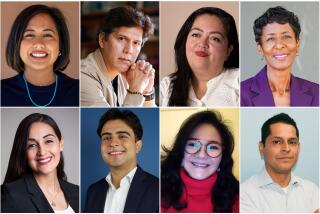Arabs Seek Official Voice in Jerusalem
- Share via
JERUSALEM — Amin Majjaj, retired medical director of a hospital on the Mount of Olives, is the last ranking member of the City Council that once governed the Palestinian portion of Jerusalem.
Too old and feeble to emerge from his home these days, Majjaj is an obscure symbol of Palestinian resistance to Israeli rule of this disputed city.
Ever since Israel annexed Jerusalem and dissolved the Palestinian City Council 31 years ago, Arab residents generally have refused to participate in the six elections that followed. To do so, they reasoned, would give recognition to Israeli control of a city that both sides claim as their capital.
And that has left Jerusalem’s Arabs with little voice in a local government that they say discriminates against them.
Israel holds municipal elections next week. And for the first time, a slate of Arab Israelis is competing for seats on the 31-member Jerusalem City Council amid a crowded field of Israeli Jews.
Mousa Illyan, a 47-year-old accountant and insurance agent, heads the Arab list as its mayoral candidate. His decision to run has sparked furious protest among Palestinian leaders who are demanding that he quit the race.
The leadership is urging Arabs to boycott the election, saying their votes would be used by Israelis to bolster a claim on the city just as its fate soon may be negotiated in U.S.-sponsored peace talks.
Illyan insists that the only way to improve the lot of Palestinian residents is to work from within the city government.
This in no way recognizes Israeli authority over the city, he said.
A Jerusalem resident does not have to be a citizen of Israel to vote for or serve on the City Council, he noted.
“Because we are Arabs we are treated like a minority,” Illyan said in his accounting office, which doubles as campaign headquarters. “I realized we will never get services as long as we are outside the municipal political structure.”
The approximately 180,000 Arabs who live in Jerusalem make up nearly 30% of the population, but they say their neighborhoods are woefully neglected by municipal authorities who won’t pave their roads or collect their garbage. Arab residents complain that they are being squeezed out of the city by officials who deny them building permits, take away their identity cards or confiscate their land to make way for Jewish expansion.
Faisal Husseini, the Palestinian Authority representative in charge of Jerusalem, assailed Illyan’s candidacy and warned that a boycott is more critical now than ever.
“We will not accept that anyone try to make it appear that there is a Palestinian green light to recognize the annexation of Jerusalem,” Husseini told a news conference last week. “We only recognize one legitimate municipality, and that is the Jerusalem municipality which existed before 1967.”
An interim peace agreement signed by Israel and the Palestinians last month in Washington clears the way for so-called permanent status talks, which will include Jerusalem.
Jerusalem was divided between Israeli and Jordanian control until the 1967 Six-Day War, when Israel captured the east side of the city, along with the West Bank.
Although Israel has returned portions of the West Bank to Palestinian rule, the Jewish state claims Jerusalem as its “eternal undivided capital.”
Palestinians want Jerusalem--or at least its east side--as the capital of a future Palestinian state.
Arabic-language fliers circulating in East Jerusalem have branded Illyan a traitor to the Palestinian cause. Amid the condemnation from Palestinian leaders, nine of the 20 Arabs he persuaded to run with him on his slate have dropped out.
But it could be worse. In 1987, when a prominent Palestinian intellectual floated the idea of running for the City Council, his cars were firebombed.
“I believe a majority [of Jerusalem’s Arabs] approve of what I am doing, although they may be silent,” Illyan said.
Jewish politicians, who might have objected to an Arab candidacy in the past, now see an advantage: Attracting Arab voters can lend credibility to the process without diluting Jewish control of the government.
Mayor Ehud Olmert of the Likud Party is seeking reelection and has gone so far as to print leaflets in Arabic pledging to fight for Arab rights.
More to Read
Sign up for Essential California
The most important California stories and recommendations in your inbox every morning.
You may occasionally receive promotional content from the Los Angeles Times.














